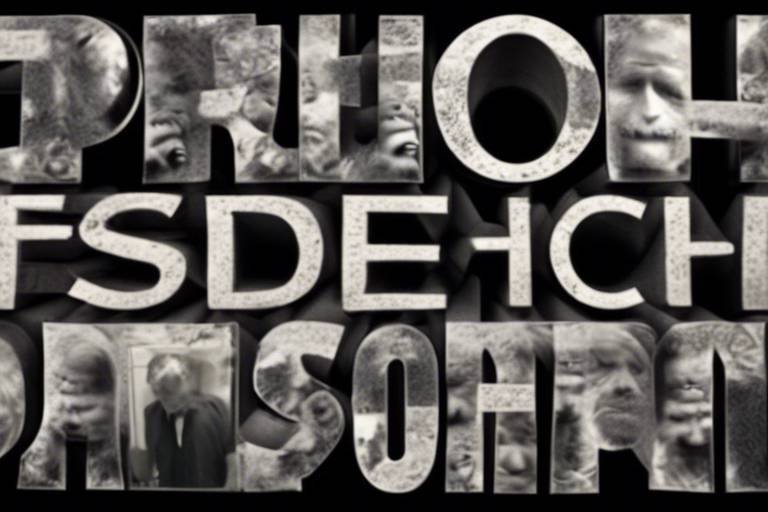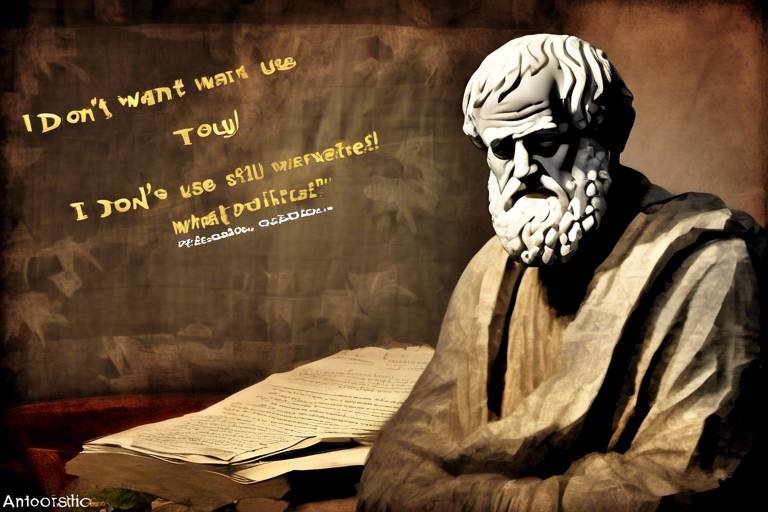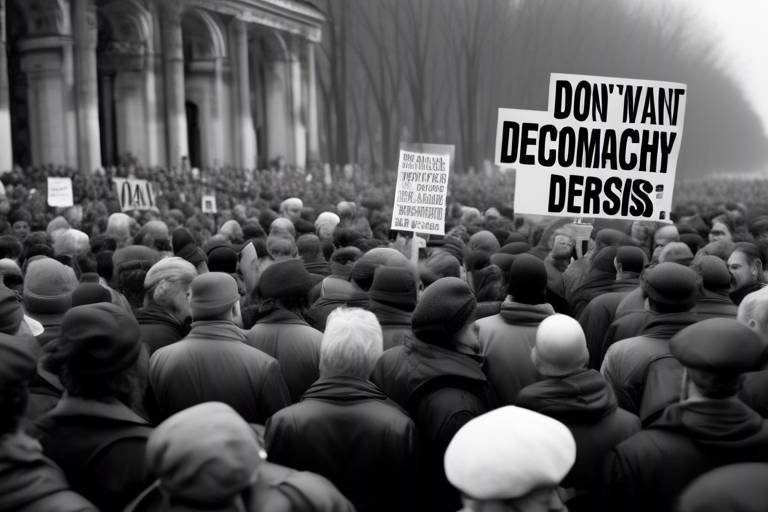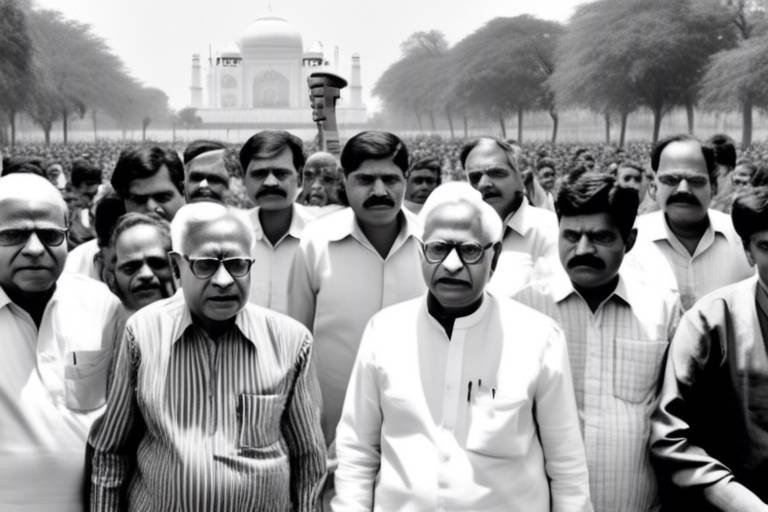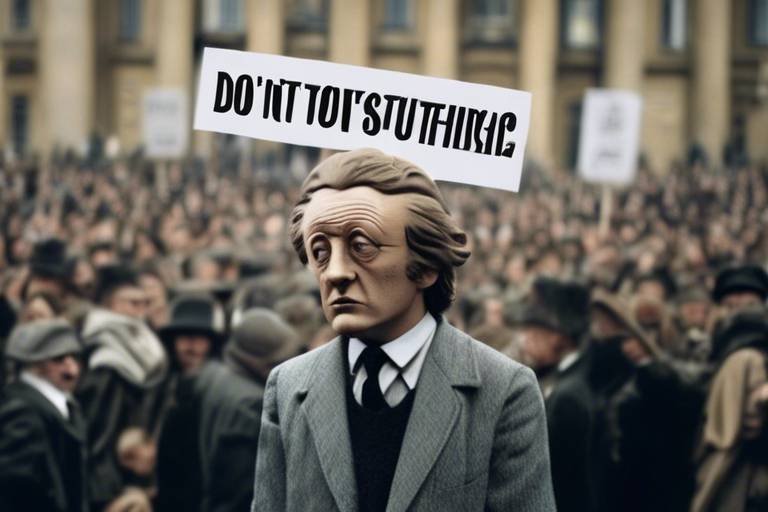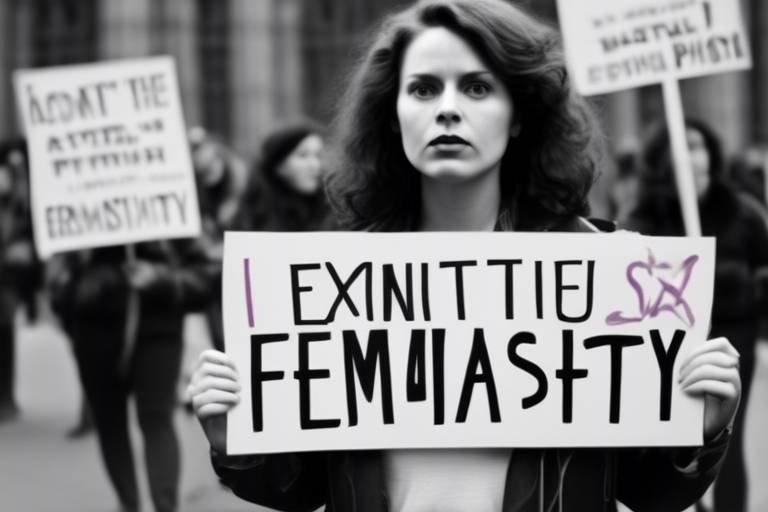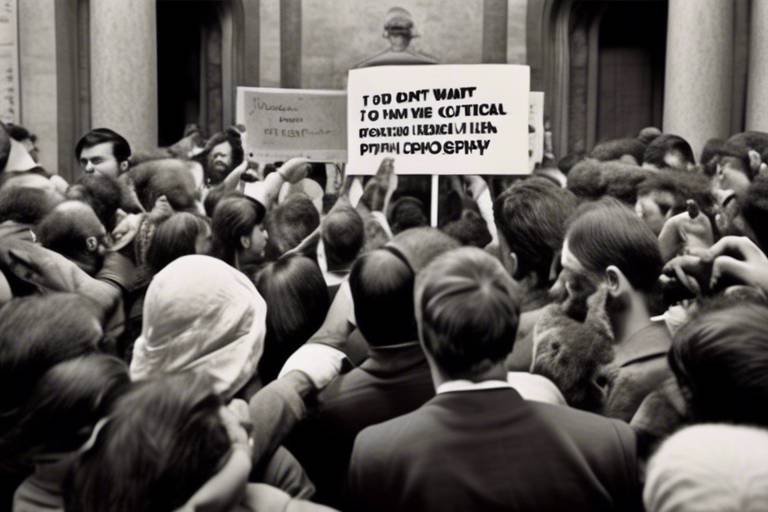Was Machiavelli Right - A Philosophical Dive into The Prince
This article explores the relevance of Machiavelli's ideas in The Prince, examining his views on power, human nature, and ethics, and their implications for modern political thought.
To truly appreciate the insights of Niccolò Machiavelli, one must first understand the tumultuous landscape of Renaissance Italy. During Machiavelli's time, Italy was not the unified nation we recognize today; rather, it was a patchwork of city-states, each vying for power and control. The political climate was akin to a game of chess, where alliances shifted and betrayals were common. This chaos was not just a backdrop but a driving force behind Machiavelli's writings. He observed firsthand the struggles between powerful families, such as the Medici and the Sforza, and the constant threat of foreign invasion. This environment shaped his thoughts on governance and the often harsh realities rulers faced. In essence, Machiavelli's experiences instilled in him a pragmatic view of politics, one that emphasized effectiveness over idealism.
At the heart of The Prince lie several key themes that challenge conventional wisdom about leadership. Machiavelli's exploration of power is perhaps the most significant. He posits that power is not merely a means to an end but rather a fundamental requirement for political stability. In his view, a ruler must be adept at acquiring and maintaining authority, especially in a world where rivals lurk at every corner. This brings us to a crucial question: should morality be sacrificed for the sake of political expediency? Machiavelli argues that, in many instances, it must be. He suggests that traditional moral values can hinder effective governance, as leaders may need to make difficult choices that prioritize the state over ethical considerations.
Machiavelli’s perspective on power emphasizes its necessity for political stability. He understood that in a competitive and often treacherous political landscape, rulers must be strategic. The acquisition of power is not merely about brute force; it requires cunning, foresight, and sometimes, a touch of deception. For Machiavelli, the ends often justify the means. This notion can be unsettling, yet it reflects a realistic understanding of human nature and the unpredictable dynamics of power. A ruler who fails to recognize these realities may find themselves ousted by more astute rivals. Thus, Machiavelli’s insights remain relevant, prompting us to consider the balance between ethical governance and the harsh demands of political life.
Delving deeper into the tension between power and morality, Machiavelli presents a provocative argument: effective governance may necessitate the abandonment of traditional moral values. He contends that a successful ruler must sometimes act immorally to safeguard the state. This idea raises an important question: can a ruler truly be effective if they adhere strictly to moral guidelines? Machiavelli’s answer is a resounding no. He believes that the complexities of political life often require leaders to make choices that might seem morally questionable but ultimately serve a greater good. This perspective challenges us to rethink our assumptions about ethics in politics and consider the implications of Machiavelli's realism.
With his realist approach to politics, Machiavelli challenges idealistic views that often dominate political discourse. He argues that understanding human nature is crucial for effective leadership. People, he posits, are driven by self-interest, and this reality must be acknowledged by anyone seeking to govern successfully. By recognizing the unpredictable dynamics of power, leaders can better navigate the complexities of political life. Machiavelli’s emphasis on realism encourages us to confront uncomfortable truths about governance and the nature of power, urging us to adopt a more nuanced understanding of political strategy.
Another central theme in The Prince is the concept of virtù. For Machiavelli, virtù is not merely about moral virtue but is a combination of skill, luck, and decisiveness. It represents the qualities a ruler must possess to navigate the complexities of political life successfully. A ruler endowed with virtù can adapt to changing circumstances, seize opportunities, and make bold decisions when necessary. This concept underscores the importance of pragmatic leadership in a world where unpredictability is the norm. Ultimately, virtù serves as a reminder that effective governance requires more than just adherence to ethical principles; it demands a strategic mindset and the ability to act decisively.
Over the centuries, Machiavelli's work has elicited a wide range of reactions, from admiration to outright condemnation. His ideas have sparked debates about the nature of power and the ethics of political leadership. Many view The Prince as a foundational text in political theory, while others criticize it as a manual for tyranny. Understanding the reception of Machiavelli's ideas is crucial for grasping their lasting impact on political thought.
Machiavelli's ideas have profoundly shaped modern political science, providing a foundation for discussions on power dynamics and statecraft. His realistic approach to politics has influenced countless political theorists, prompting them to consider the complexities of governance and the often harsh realities leaders face. Today, many political analysts draw upon Machiavelli's insights to navigate contemporary political landscapes, illustrating his enduring relevance.
Despite his influence, Machiavelli's ideas have often been misinterpreted. Critics frequently label him as an advocate of tyranny, overlooking the nuanced nature of his arguments. In truth, Machiavelli sought to provide a realistic assessment of political necessity rather than promote immoral governance. By addressing these critiques, we can better appreciate the complexity of Machiavelli's thought and its implications for modern political discourse.
- What is the main argument of Machiavelli in The Prince? Machiavelli argues that effective governance often requires the abandonment of traditional moral values in favor of pragmatic decision-making.
- How has Machiavelli influenced modern politics? His realistic approach to power dynamics has shaped political theory, encouraging leaders to consider the complexities of governance.
- Is Machiavelli advocating for tyranny? While often misinterpreted as such, Machiavelli's work offers a realistic assessment of political necessity rather than a promotion of tyranny.

The Prince,
This article explores the relevance of Machiavelli's ideas in The Prince, examining his views on power, human nature, and ethics, and their implications for modern political thought.
Understanding Machiavelli's historical background, including the political turmoil of Renaissance Italy, is essential to grasp the motivations behind his writings and the principles he advocates in The Prince.
This section delves into the central themes of The Prince, such as the nature of power, the role of morality in politics, and the concept of virtù, highlighting Machiavelli's pragmatic approach to governance.
Machiavelli's perspective on power emphasizes its necessity for political stability, examining how rulers can acquire and maintain authority in a competitive and often treacherous political landscape. He argues that power is not merely a means to an end but a fundamental aspect of governance that shapes the very fabric of society. In his view, a ruler must be prepared to act decisively and sometimes ruthlessly to secure their position and ensure the prosperity of their state. This idea can be likened to a chess game, where each move must be calculated and strategic, often requiring sacrifices for the greater good.
This subsection discusses the tension between ethical considerations and effective governance, illustrating how Machiavelli argues that traditional moral values may need to be set aside for the sake of political expediency. He famously posits that "the ends justify the means," suggesting that a ruler's primary responsibility is to maintain order and stability, even if it requires morally ambiguous actions. This perspective raises profound questions about the nature of ethics in politics: should leaders prioritize moral integrity, or is it more important to achieve tangible results? The implications of this debate continue to resonate in contemporary political discourse.
Machiavelli's realist approach to politics challenges idealistic views, suggesting that understanding human nature and the unpredictable dynamics of power is crucial for effective leadership. He paints a rather bleak picture of humanity, viewing people as self-interested and often fickle. This perspective compels rulers to adopt a pragmatic stance, where decisions are based on the harsh realities of the political landscape rather than lofty ideals. Much like a seasoned sailor navigating through stormy seas, a successful leader must be adept at reading the winds of change and adjusting their course accordingly.
Exploring the idea of virtù, this section explains how Machiavelli views it as a combination of skill, luck, and decisiveness, essential for a ruler to navigate the complexities of political life. Virtù is not merely about virtue in the traditional sense; rather, it embodies the qualities that enable a leader to adapt to changing circumstances and seize opportunities as they arise. In this way, Machiavelli elevates the concept of leadership to an art form, where the most effective rulers are those who can blend their personal attributes with the unpredictable nature of fortune.
Machiavelli's work has been met with both admiration and criticism over the centuries; this section examines how The Prince has influenced political theory and the controversies surrounding its interpretation.
This subsection highlights how Machiavelli's ideas have shaped modern political science, providing a foundation for discussions on power dynamics and statecraft in contemporary political discourse. His work has inspired countless leaders and theorists, prompting them to rethink the relationship between ethics and politics. In many ways, Machiavelli serves as a bridge between ancient philosophical thought and modern political theory, emphasizing the importance of realism in governance.
Addressing the criticisms of Machiavelli, this section explores how his ideas have often been misinterpreted as advocating tyranny, rather than as a realistic assessment of political necessity. Critics argue that his emphasis on power and pragmatism promotes a cynical view of politics, potentially justifying oppressive regimes. However, a closer examination reveals that Machiavelli's intent was not to endorse tyranny but to provide a realistic framework for understanding the complexities of political leadership.
- What is the main argument of The Prince?
The main argument of The Prince is that effective governance often requires rulers to prioritize power and stability over traditional moral values. - How does Machiavelli define virtù?
Machiavelli defines virtù as a combination of skill, luck, and decisiveness that enables a ruler to navigate political challenges successfully. - Has Machiavelli's work influenced modern politics?
Yes, Machiavelli's ideas have significantly influenced modern political thought, particularly in discussions about power dynamics and statecraft. - Why is Machiavelli often misunderstood?
Machiavelli is often misunderstood because his pragmatic approach is sometimes interpreted as an endorsement of tyranny rather than a realistic assessment of political necessity.

examining his views on power, human nature, and ethics, and their implications for modern political thought.
This article explores the relevance of Machiavelli's ideas in The Prince, examining his views on power, human nature, and ethics, and their implications for modern political thought.
Understanding Machiavelli's historical background, including the political turmoil of Renaissance Italy, is essential to grasp the motivations behind his writings and the principles he advocates in The Prince.
This section delves into the central themes of The Prince, such as the nature of power, the role of morality in politics, and the concept of virtù, highlighting Machiavelli's pragmatic approach to governance.
Machiavelli's perspective on power emphasizes its necessity for political stability, examining how rulers can acquire and maintain authority in a competitive and often treacherous political landscape.
This subsection discusses the tension between ethical considerations and effective governance, illustrating how Machiavelli argues that traditional moral values may need to be set aside for the sake of political expediency.
Machiavelli's realist approach to politics challenges idealistic views, suggesting that understanding human nature and the unpredictable dynamics of power is crucial for effective leadership.
Exploring the idea of virtù, this section explains how Machiavelli views it as a combination of skill, luck, and decisiveness, essential for a ruler to navigate the complexities of political life.
Machiavelli's work has been met with both admiration and criticism over the centuries; this section examines how The Prince has influenced political theory and the controversies surrounding its interpretation.
This subsection highlights how Machiavelli's ideas have shaped modern political science, providing a foundation for discussions on power dynamics and statecraft in contemporary political discourse.
Addressing the criticisms of Machiavelli, this section explores how his ideas have often been misinterpreted as advocating tyranny, rather than as a realistic assessment of political necessity.
Machiavelli's insights into power, human nature, and ethics are as relevant today as they were in the 16th century. His assertion that power is a fundamental aspect of governance highlights a crucial reality: without power, a ruler cannot effectively implement policies or maintain order. This leads us to consider the often uncomfortable relationship between ethics and political authority. Machiavelli famously stated that the ends justify the means, which raises eyebrows and provokes debates about moral relativism in politics. Is it acceptable for leaders to engage in deceit or manipulation if it serves a greater good?
Moreover, Machiavelli's views on human nature are particularly striking. He posits that humans are inherently self-interested and driven by desires, which can lead to conflict and instability. This perspective challenges the idealistic notion that people are inherently good and can be trusted to act in the interest of the collective. By acknowledging this darker side of humanity, Machiavelli provides a pragmatic lens through which to evaluate political behavior, urging leaders to be realistic about their constituents' motivations.
In today's political landscape, we see echoes of Machiavelli's ideas. Leaders often grapple with the balance between ethical governance and the harsh realities of political life. For instance, consider the ongoing debates around transparency and accountability in government. While voters demand honesty, politicians frequently face the dilemma of whether to disclose information that could undermine their authority or effectiveness. This tension speaks to Machiavelli's assertion that sometimes, a leader must prioritize stability and control over ethical considerations.
Furthermore, Machiavelli's concept of virtù, which encompasses skill, luck, and decisiveness, remains pertinent. In modern politics, successful leaders often exhibit a unique blend of these traits, navigating complex challenges with a strategic mindset. The ability to adapt to unforeseen circumstances, much like a chess player anticipating an opponent's moves, is essential for contemporary politicians aiming to maintain their power and influence.
Ultimately, Machiavelli compels us to confront uncomfortable truths about governance and human behavior. His ideas invite us to ask critical questions: How do we define ethical leadership in a world where power dynamics are ever-shifting? Can we reconcile the need for authority with the desire for moral integrity? As we explore these themes, it becomes clear that Machiavelli's legacy is not merely a historical artifact but a living dialogue that continues to shape our understanding of politics today.
- What is the main argument of Machiavelli in The Prince? Machiavelli argues that the acquisition and maintenance of power is essential for political stability, often suggesting that moral considerations may need to be set aside for effective governance.
- How does Machiavelli's view of human nature influence his political theories? He believes that humans are inherently self-interested, which influences his pragmatic approach to politics and leadership.
- Is Machiavelli advocating for tyranny in The Prince? Many critics misinterpret his work as advocating tyranny; however, he is more focused on providing a realistic assessment of political necessity.
- What relevance do Machiavelli’s ideas have in modern politics? His insights into power dynamics, ethical governance, and human nature continue to resonate in contemporary political discourse, prompting ongoing debates about the nature of leadership.
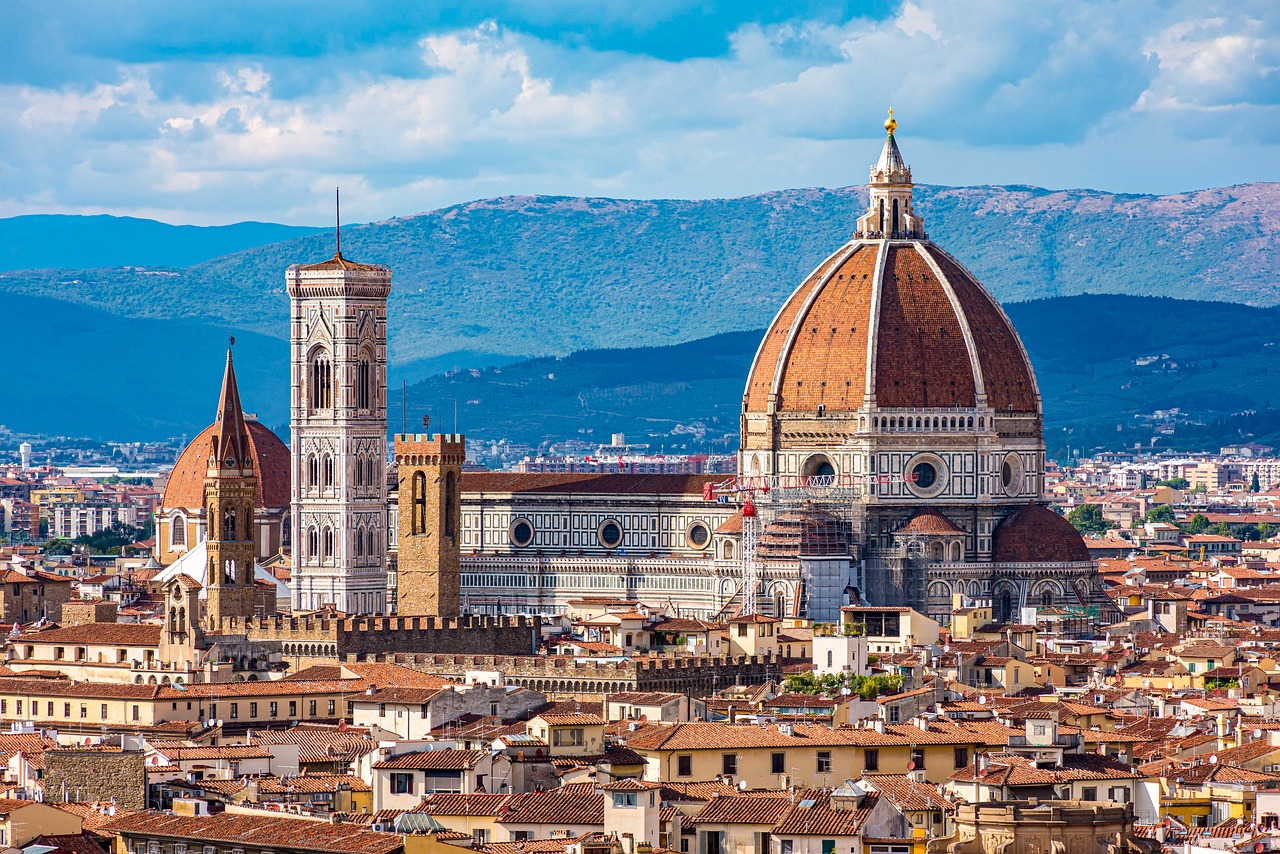
The Context of Machiavelli's Life
To truly understand Machiavelli's ideas in The Prince, it's crucial to delve into the historical backdrop of his life. Born in 1469 in Florence, Italy, Machiavelli lived during a time of immense political upheaval and transformation. The Renaissance was in full swing, a period marked not only by a revival of classical learning but also by intense power struggles among city-states. Imagine a vibrant tapestry of art, culture, and ideas, interwoven with the darker threads of political intrigue and betrayal.
Florence, under the Medici family, was a hub of political maneuvering, where alliances shifted like sand in the wind. The Medici were not just patrons of the arts; they were also formidable political players. Their rise and fall set the stage for Machiavelli's own career as a diplomat and political advisor. His experiences in the tumultuous world of Renaissance politics provided him with a front-row seat to the machinations of power. He witnessed firsthand how leaders rose to power, clung to it, or lost it altogether, often through ruthless means.
During this time, Italy was fragmented into various city-states, each vying for dominance. The constant warfare and shifting allegiances created a landscape where the stakes were incredibly high. In such an environment, the question of how to maintain stability and control became paramount. Machiavelli's observations of these political dynamics deeply influenced his thoughts on governance, leading him to formulate ideas that were both pragmatic and controversial.
Moreover, Machiavelli's personal life was marked by challenges that further shaped his worldview. After the Medici returned to power in 1512, he was imprisoned and tortured, an experience that undoubtedly colored his views on power and human nature. This backdrop of personal and political turmoil fueled his belief that the ends often justify the means—a notion that many have grappled with ever since.
The Renaissance was not just a time of artistic brilliance but also a period of profound philosophical inquiry. Thinkers like Plato and Aristotle laid the groundwork for political philosophy, but Machiavelli took a different route. He was less concerned with ideals and more focused on the gritty realities of political life. This divergence from traditional philosophical thought is what makes his work so compelling and, at times, controversial.
In summary, to grasp Machiavelli's insights in The Prince, one must appreciate the complex interplay of personal experience and historical context that shaped his ideas. His life was a microcosm of the broader political landscape of Renaissance Italy, where the struggle for power was both an art and a science. Understanding this context not only enriches our reading of Machiavelli but also invites us to reflect on the timeless nature of his observations about power, ethics, and human behavior.

The Prince.
This article explores the relevance of Machiavelli's ideas in The Prince, examining his views on power, human nature, and ethics, and their implications for modern political thought.
Understanding Machiavelli's historical background, including the political turmoil of Renaissance Italy, is essential to grasp the motivations behind his writings and the principles he advocates in The Prince.
This section delves into the central themes of The Prince, such as the nature of power, the role of morality in politics, and the concept of virtù, highlighting Machiavelli's pragmatic approach to governance.
Machiavelli's perspective on power emphasizes its necessity for political stability, examining how rulers can acquire and maintain authority in a competitive and often treacherous political landscape.
This subsection discusses the tension between ethical considerations and effective governance, illustrating how Machiavelli argues that traditional moral values may need to be set aside for the sake of political expediency.
Machiavelli's realist approach to politics challenges idealistic views, suggesting that understanding human nature and the unpredictable dynamics of power is crucial for effective leadership.
Exploring the idea of virtù, this section explains how Machiavelli views it as a combination of skill, luck, and decisiveness, essential for a ruler to navigate the complexities of political life.
Machiavelli's work has been met with both admiration and criticism over the centuries; this section examines how The Prince has influenced political theory and the controversies surrounding its interpretation.
This subsection highlights how Machiavelli's ideas have shaped modern political science, providing a foundation for discussions on power dynamics and statecraft in contemporary political discourse.
Addressing the criticisms of Machiavelli, this section explores how his ideas have often been misinterpreted as advocating tyranny, rather than as a realistic assessment of political necessity.
- What is the main idea of The Prince?
The main idea of The Prince revolves around the acquisition and maintenance of political power. Machiavelli emphasizes that the ends often justify the means, suggesting that rulers may need to act immorally to achieve and sustain authority.
- Is Machiavelli advocating for evil in politics?
Many interpret Machiavelli's work as a pragmatic guide to ruling rather than a blueprint for tyranny. He presents a realistic view of human nature and governance, which can be misconstrued as advocating for unethical behavior.
- How has The Prince influenced modern politics?
The Prince has significantly influenced modern political thought, providing insights into power dynamics, statecraft, and the complexities of leadership that remain relevant in today's political landscape.

This article explores the relevance of Machiavelli's ideas in The Prince, examining his views on power, human nature, and ethics, and their implications for modern political thought.
Understanding Machiavelli's historical background, including the political turmoil of Renaissance Italy, is essential to grasp the motivations behind his writings and the principles he advocates in The Prince. Born in 1469 in Florence, Machiavelli lived through a period marked by intense political strife, shifting alliances, and the rise and fall of powerful families. The Medici family, in particular, played a significant role in the political landscape, often dictating the course of events. This chaotic environment influenced Machiavelli's thoughts on governance and the nature of power. He witnessed firsthand how leaders could rise to power through cunning and manipulation, and he became acutely aware of the fragility of political stability.
This section delves into the central themes of The Prince, such as the nature of power, the role of morality in politics, and the concept of virtù, highlighting Machiavelli's pragmatic approach to governance.
Machiavelli's perspective on power emphasizes its necessity for political stability, examining how rulers can acquire and maintain authority in a competitive and often treacherous political landscape. In his view, power is not merely a means to an end but rather an essential component of governance. He argues that a leader must be prepared to act decisively and, at times, ruthlessly to secure their position. This understanding of power as a dynamic and sometimes brutal force is crucial for any ruler who wishes to maintain control and ensure the longevity of their reign.
This subsection discusses the tension between ethical considerations and effective governance, illustrating how Machiavelli argues that traditional moral values may need to be set aside for the sake of political expediency. He famously stated that the ends justify the means, suggesting that rulers must prioritize their political objectives over conventional morality. This perspective has led many to label Machiavelli as a proponent of tyranny; however, it is essential to recognize that he was merely reflecting the harsh realities of political life during his time.
Machiavelli's realist approach to politics challenges idealistic views, suggesting that understanding human nature and the unpredictable dynamics of power is crucial for effective leadership. Unlike theorists who advocate for an idealized version of governance, Machiavelli emphasizes the importance of pragmatism. He believes that rulers should be aware of the darker aspects of human behavior, including greed and ambition, and use this knowledge to navigate the complexities of political life.
Exploring the idea of virtù, this section explains how Machiavelli views it as a combination of skill, luck, and decisiveness, essential for a ruler to navigate the complexities of political life. Virtù is not merely about being virtuous in the traditional sense; instead, it encompasses the ability to adapt to changing circumstances and make bold decisions. A ruler with virtù possesses the qualities necessary to seize opportunities and effectively respond to challenges, ultimately ensuring their success in the political arena.
Machiavelli's work has been met with both admiration and criticism over the centuries; this section examines how The Prince has influenced political theory and the controversies surrounding its interpretation.
This subsection highlights how Machiavelli's ideas have shaped modern political science, providing a foundation for discussions on power dynamics and statecraft in contemporary political discourse. His work has inspired countless political leaders and theorists, making it a cornerstone of political philosophy. The examination of power, governance, and human behavior in The Prince continues to resonate in today's political landscape, influencing everything from international relations to domestic policy.
Addressing the criticisms of Machiavelli, this section explores how his ideas have often been misinterpreted as advocating tyranny, rather than as a realistic assessment of political necessity. Many critics argue that his pragmatic approach promotes unethical behavior; however, it is crucial to understand that Machiavelli was writing in a context where survival often depended on one's ability to navigate a treacherous political environment. His insights into the nature of power and human behavior remain relevant, even as they spark debate and controversy.
- What is the main idea behind Machiavelli's The Prince?
The main idea revolves around the pragmatic approach to politics, emphasizing that rulers must be willing to set aside moral considerations to maintain power and stability.
- How did Machiavelli's life influence his writings?
Machiavelli's experiences in the politically tumultuous environment of Renaissance Italy shaped his views on power, governance, and human nature.
- Is Machiavelli advocating for tyranny?
No, while some interpret his work that way, Machiavelli's writings are more about understanding the realities of political life rather than promoting tyranny.

Key Themes in The Prince
Machiavelli's The Prince is not just a manual for aspiring tyrants; it is a profound exploration of the intricacies of power and governance. One of the key themes that emerges from his work is the nature of power itself. Machiavelli asserts that power is an essential component for political stability and survival. In a world where political landscapes shift like sand dunes, rulers must not only acquire power but also learn to maintain it against a backdrop of treachery and competition. This pragmatic view of power challenges the idealistic notions that often dominate political discourse.
Another significant theme in Machiavelli's work is the tension between power and morality. He provocatively suggests that traditional moral values may need to be set aside for the sake of political expediency. This raises an intriguing question: can a ruler truly be effective while adhering strictly to ethical norms? Machiavelli's answer is a resounding no. He argues that in the ruthless game of politics, the ends often justify the means. This perspective can be unsettling, as it forces us to confront the uncomfortable reality that ethical considerations may not always align with the demands of effective governance.
Moreover, Machiavelli's realist approach to politics offers a stark contrast to the idealistic views that often pervade political theory. He emphasizes the importance of understanding human nature and the unpredictable dynamics of power. In his eyes, a successful leader must be astute, adaptable, and, at times, ruthless. This realism is not just a reflection of Machiavelli's cynical worldview; it is a call to action for leaders to engage with the complexities of their environments rather than cling to naive beliefs about how politics should operate.
Furthermore, the concept of virtù stands out as a central pillar in Machiavelli's philosophy. Virtù is not merely about virtue in the moral sense; instead, it encapsulates a blend of skill, luck, and decisiveness that a ruler must possess to navigate the turbulent waters of political life. A ruler with virtù is someone who can seize opportunities and respond effectively to challenges, embodying the very essence of leadership in a chaotic world. This idea invites us to consider: what qualities do modern leaders need to thrive in today’s complex political landscape?
In summary, the key themes in The Prince revolve around the multifaceted nature of power, the complex relationship between morality and governance, the importance of realism in political thought, and the concept of virtù. Each of these themes offers a lens through which we can better understand not only Machiavelli's time but also the political dynamics that continue to shape our world today.

The Prince,
This article explores the relevance of Machiavelli's ideas in The Prince, examining his views on power, human nature, and ethics, and their implications for modern political thought.
Understanding Machiavelli's historical background, including the political turmoil of Renaissance Italy, is essential to grasp the motivations behind his writings and the principles he advocates in The Prince. Born in 1469 in Florence, Machiavelli lived through a period marked by political instability, shifting alliances, and foreign invasions. The Medici family's rule, the rise and fall of various city-states, and the constant struggle for power painted a chaotic picture that deeply influenced his thoughts. Imagine living in a world where betrayal was commonplace, and the line between friend and foe blurred; this was Machiavelli's reality. His experiences as a diplomat and political advisor provided him with firsthand insights into the nature of power, shaping the ideas that would later be encapsulated in his seminal work.
This section delves into the central themes of The Prince, such as the nature of power, the role of morality in politics, and the concept of virtù, highlighting Machiavelli's pragmatic approach to governance.
Machiavelli's perspective on power emphasizes its necessity for political stability, examining how rulers can acquire and maintain authority in a competitive and often treacherous political landscape. He famously stated, "It is better to be feared than loved, if you cannot be both." This quote encapsulates his belief that power is inherently tied to control and influence. In his view, a ruler must be shrewd, strategic, and sometimes ruthless. The political arena, according to Machiavelli, is not a place for the faint-hearted; it demands a certain level of cunning and adaptability. The ability to navigate the complexities of human behavior and societal expectations is crucial for any leader wishing to succeed.
This subsection discusses the tension between ethical considerations and effective governance, illustrating how Machiavelli argues that traditional moral values may need to be set aside for the sake of political expediency. He posits that while morality is important, it can often be a hindrance in the ruthless world of politics. Rulers must sometimes engage in actions that are morally questionable to achieve their goals. This pragmatic approach raises profound questions: Should the ends justify the means? Is it acceptable for leaders to compromise their ethics for the sake of stability? Machiavelli's insights challenge us to reconsider the role of morality in leadership and governance.
Machiavelli's realist approach to politics challenges idealistic views, suggesting that understanding human nature and the unpredictable dynamics of power is crucial for effective leadership. He believed that human beings are inherently self-interested, often driven by greed, ambition, and a desire for power. This perspective leads to a stark, sometimes cynical view of politics where leaders must be prepared to confront harsh realities. By embracing realism, Machiavelli encourages rulers to focus on practical solutions rather than lofty ideals, fostering a more grounded approach to governance.
Exploring the idea of virtù, this section explains how Machiavelli views it as a combination of skill, luck, and decisiveness, essential for a ruler to navigate the complexities of political life. Virtù is not merely about moral virtue; it encompasses a ruler's ability to adapt to changing circumstances, seize opportunities, and make tough decisions. Machiavelli argues that a successful leader must possess a certain flair—an ability to inspire loyalty and fear simultaneously. This multifaceted concept of virtù invites us to ponder: What qualities make a leader truly effective? Is it merely their actions, or is it also their perception in the eyes of the people?
Machiavelli's work has been met with both admiration and criticism over the centuries; this section examines how The Prince has influenced political theory and the controversies surrounding its interpretation.
This subsection highlights how Machiavelli's ideas have shaped modern political science, providing a foundation for discussions on power dynamics and statecraft in contemporary political discourse. His insights into the mechanisms of power and the nature of leadership continue to resonate today, influencing politicians, scholars, and strategists alike. Machiavelli's work has paved the way for a more analytical approach to politics, encouraging a move away from purely ideological perspectives towards a more empirical understanding of governance.
Addressing the criticisms of Machiavelli, this section explores how his ideas have often been misinterpreted as advocating tyranny, rather than as a realistic assessment of political necessity. Many critics argue that Machiavelli's emphasis on power and manipulation promotes unethical behavior. However, a closer examination reveals that his intent was not to glorify such actions but to provide a candid assessment of political realities. Understanding this nuance is critical to appreciating his contributions to political thought.
- What is the main argument of The Prince?
The main argument of The Prince is that effective governance often requires a pragmatic approach to power that may involve morally ambiguous actions. - How did Machiavelli's background influence his writing?
Machiavelli's experiences in the politically unstable environment of Renaissance Italy deeply influenced his views on power and leadership. - Is Machiavelli advocating for tyranny?
No, Machiavelli is not advocating for tyranny; rather, he provides a realistic perspective on the complexities of political leadership.

such as the nature of power, the role of morality in politics, and the concept of virtù, highlighting Machiavelli's pragmatic approach to governance.
This article explores the relevance of Machiavelli's ideas in The Prince, examining his views on power, human nature, and ethics, and their implications for modern political thought.
Understanding Machiavelli's historical background, including the political turmoil of Renaissance Italy, is essential to grasp the motivations behind his writings and the principles he advocates in The Prince.
This section delves into the central themes of The Prince, such as the nature of power, the role of morality in politics, and the concept of virtù, highlighting Machiavelli's pragmatic approach to governance.
Machiavelli's perspective on power emphasizes its necessity for political stability. He argues that power is not merely a tool for rulers but a fundamental component of governance. In a world where rival factions and external threats abound, the ability to acquire and maintain authority becomes paramount. Machiavelli suggests that a ruler must be shrewd, capable of maneuvering through a landscape filled with treachery and deceit. He famously states, “It is better to be feared than loved, if you cannot be both.” This assertion underscores the harsh reality that in politics, love can be fleeting, but fear can ensure obedience.
This subsection discusses the tension between ethical considerations and effective governance. Machiavelli contends that traditional moral values may need to be set aside for the sake of political expediency. In his view, a successful ruler must sometimes act immorally to achieve desirable outcomes. This leads to a provocative question: should the ends justify the means? Machiavelli's answer leans towards a pragmatic yes, as he believes that the stability of the state often outweighs individual moral dilemmas. As he puts it, “The wise ruler cannot, and should not, keep his word when it would be to his disadvantage.”
Machiavelli's realist approach to politics challenges idealistic views, suggesting that understanding human nature and the unpredictable dynamics of power is crucial for effective leadership. He paints a rather bleak picture of humanity, asserting that people are inherently self-interested and unreliable. This recognition of human flaws leads to a more grounded view of governance, one that prioritizes practical strategies over lofty ideals. For Machiavelli, the political arena is akin to a battlefield, where the stakes are high, and the rules are often bent or broken. Thus, a ruler must be prepared to adapt to changing circumstances, using both cunning and force when necessary.
Exploring the idea of virtù, this section explains how Machiavelli views it as a combination of skill, luck, and decisiveness, essential for a ruler to navigate the complexities of political life. Virtù is not merely about virtue in the traditional sense; rather, it encompasses a ruler's ability to shape their destiny through bold actions and strategic thinking. In Machiavelli's eyes, a leader with virtù can seize opportunities and overcome obstacles, much like a skilled chess player who anticipates their opponent's moves. This concept reinforces the notion that effective governance is as much about personal qualities as it is about external circumstances.
Machiavelli's work has been met with both admiration and criticism over the centuries; this section examines how The Prince has influenced political theory and the controversies surrounding its interpretation.
This subsection highlights how Machiavelli's ideas have shaped modern political science, providing a foundation for discussions on power dynamics and statecraft in contemporary political discourse.
Addressing the criticisms of Machiavelli, this section explores how his ideas have often been misinterpreted as advocating tyranny, rather than as a realistic assessment of political necessity.
- What is the main idea of Machiavelli's The Prince?
The main idea revolves around the pragmatic approach to ruling, emphasizing the importance of power and the often harsh realities of political life.
- Does Machiavelli advocate for immoral behavior?
While some interpret his work as advocating immorality, Machiavelli argues that sometimes ethical considerations must be set aside for the greater good of the state.
- What does virtù mean in the context of The Prince?
Virtù refers to a ruler's ability to adapt, seize opportunities, and decisively act in the face of challenges, blending skill and luck.

The Nature of Power
Machiavelli's exploration of power is nothing short of a deep dive into the very essence of political life. He argues that power is not merely a tool but a necessity for political stability. In a world where political landscapes shift like sand, understanding how to acquire and maintain authority becomes paramount for any ruler. Think of power as a double-edged sword; it can protect, but it can also destroy. Machiavelli emphasizes that a ruler must be both a lion and a fox—strong enough to intimidate and cunning enough to outsmart adversaries.
One of the most compelling aspects of Machiavelli's argument is the idea that power must be actively pursued and defended. In his view, rulers cannot simply sit back and hope for the best; they must engage in a constant struggle for control. This perspective challenges the romanticized notion of leadership that often portrays rulers as benevolent figures. Instead, Machiavelli paints a more pragmatic picture, suggesting that the path to power is fraught with challenges and requires a keen understanding of human nature.
To illustrate this, consider the following key points about the nature of power according to Machiavelli:
- Acquisition of Power: A ruler must be strategic in how they gain power, whether through inheritance, conquest, or popular support.
- Maintenance of Power: Once power is acquired, it requires constant vigilance and adaptability to retain it against rivals and changing circumstances.
- Power Dynamics: Understanding the relationships between different political entities is crucial; alliances can shift, and enemies can become allies in the blink of an eye.
Machiavelli also posits that the perception of power is as important as the power itself. A ruler's image can significantly influence their authority. This brings us to the idea of fear versus love—Machiavelli famously states that it is better for a ruler to be feared than loved if they cannot be both. However, he cautions against being hated, as this can lead to rebellion and instability. Therefore, the delicate balance of being respected and feared is a tightrope that every ruler must walk.
In essence, Machiavelli's view on the nature of power serves as a stark reminder that politics is not for the faint-hearted. It requires a blend of skill, strategy, and sometimes, a willingness to make tough decisions that may not align with traditional moral values. As we navigate through the complexities of modern governance, Machiavelli's insights remain eerily relevant, urging us to confront the realities of power with both wisdom and pragmatism.

Power vs. Morality
When we dive into Machiavelli's The Prince, one of the most striking themes that emerges is the complex relationship between power and morality. At first glance, it might seem that Machiavelli advocates for a ruthless approach to governance, where the ends justify the means. But is that really the case? Machiavelli challenges us to reconsider our preconceived notions about ethics in politics. He argues that, in the turbulent landscape of Renaissance Italy, a ruler must often set aside traditional moral values to maintain stability and control.
Imagine a chess game, where each piece represents a political player. The objective is to win, but sometimes you must sacrifice a pawn to protect your queen. Similarly, Machiavelli suggests that leaders might need to make difficult choices that could be perceived as immoral in order to secure their position and protect their state. He emphasizes that the reality of political life often demands a pragmatic approach, one that prioritizes the survival of the state over adherence to moral principles.
However, this pragmatic stance raises a critical question: can a ruler truly maintain power without moral integrity? Machiavelli seems to imply that while morality can be a guiding principle, it may not always be a reliable one in the chaotic world of politics. He presents the idea that a ruler must possess a certain cunning—the ability to adapt and manipulate situations to their advantage. This leads to the notion of virtù, which we will explore further in another section, but it also ties back to the moral quandaries faced by leaders.
To illustrate this tension between power and morality, let's consider a few scenarios:
- Scenario 1: A leader must decide whether to betray an ally to form a stronger alliance. The betrayal may be seen as immoral, yet it could lead to greater stability for the state.
- Scenario 2: A ruler faces a rebellion and must choose between negotiating with the rebels or using force to suppress them. While force may be brutal, it could restore order more swiftly.
- Scenario 3: Implementing policies that benefit the majority while sacrificing the rights of a minority might be viewed as unjust, yet it could be deemed necessary for the greater good.
These scenarios exemplify the difficult choices rulers must make. Machiavelli does not suggest that leaders should abandon morality altogether. Rather, he argues that a successful ruler must possess the wisdom to discern when to act ethically and when to prioritize the stability and security of their state. This balancing act is where the true art of governance lies.
In conclusion, Machiavelli's exploration of power versus morality invites us to reflect on the nature of leadership. Are leaders expected to uphold moral standards, or should they be prepared to make tough decisions that may appear morally questionable? The answer is not straightforward, and it is this complexity that continues to resonate in modern political discourse, making Machiavelli's insights as relevant today as they were in his time.
- What is the main argument of Machiavelli in The Prince? Machiavelli argues that political leaders must prioritize the stability of their state, sometimes at the expense of traditional moral values.
- Does Machiavelli advocate for tyranny? While often misinterpreted as advocating tyranny, Machiavelli's work is more about realism in politics and understanding the necessity of difficult choices.
- How does Machiavelli define virtù? Virtù is defined as a combination of skill, luck, and decisiveness that enables a ruler to navigate the complexities of political life effectively.

Realism in Politics
Machiavelli's approach to politics is often described as realist, a term that carries significant weight in the realm of political theory. But what does this really mean? At its core, realism in politics emphasizes the importance of understanding the world as it is, rather than how we wish it to be. Machiavelli believed that to be an effective leader, one must acknowledge the often harsh realities of human nature and the unpredictable dynamics of power. In a world where ambition, deceit, and competition reign supreme, turning a blind eye to these elements is a recipe for disaster.
Consider this analogy: Imagine you're a sailor navigating through a stormy sea. If you only focus on the sunny skies you wish you had, you might overlook the dark clouds gathering above you. Similarly, Machiavelli argues that political leaders must be prepared to face the storms of human behavior and societal conflict head-on. He posits that understanding the nature of power and the motivations of others is essential for survival in the political arena. This notion can be unsettling, as it suggests that morality may take a backseat to pragmatism. After all, is it not better to be feared than loved if love is fickle and fear is reliable?
To illustrate this point, Machiavelli presents several historical examples where leaders who embraced realism thrived, while those who clung to idealism often faced ruin. For instance, he reflects on the actions of Cesare Borgia, a ruthless yet effective ruler who understood the necessity of harsh measures to maintain control. Borgia’s ability to adapt to the shifting tides of power showcases Machiavelli's belief that flexibility and a keen understanding of human nature are indispensable traits for any ruler.
Moreover, Machiavelli's realism extends beyond individual leaders; it encompasses the broader political landscape. He argues that the interplay of conflict and cooperation among states is a fundamental aspect of international relations. In this light, diplomacy becomes a strategic game where understanding the motives and desires of other states is paramount. The realist perspective posits that nations act primarily in their self-interest, often leading to alliances and betrayals that can shift like sand beneath one's feet.
In essence, Machiavelli's realism serves as a wake-up call for those who might prefer the comforting embrace of idealistic notions of governance. He challenges us to question our assumptions about human nature and the role of ethics in politics. Are we ready to accept that sometimes, the ends justify the means? Are we prepared to navigate the murky waters of political life with our eyes wide open? These questions remain as relevant today as they were in the turbulent times of Renaissance Italy, urging modern leaders to adopt a more nuanced and pragmatic approach to governance.

The Concept of Virtù
Machiavelli's notion of virtù is a cornerstone of his political philosophy, representing a blend of qualities that a successful ruler must possess. Unlike the conventional understanding of virtue as moral goodness, Machiavelli's virtù encompasses a broader range of attributes, including strength, cunning, decisiveness, and the ability to adapt to changing circumstances. It's about being able to navigate the turbulent waters of politics with a skillful hand, much like a seasoned sailor who reads the winds and adjusts their sails to stay on course.
At its core, virtù is about effectiveness. Machiavelli believed that a ruler endowed with virtù could accomplish what is necessary to maintain power and ensure the stability of the state. This is particularly relevant in the unpredictable realm of politics, where external factors can shift rapidly. Think of it as a game of chess: the player must not only anticipate their opponent's moves but also remain agile enough to adapt their strategy in real-time.
To further illustrate this concept, consider the following key components of virtù:
- Skill: The ability to govern effectively, making informed decisions that benefit the state.
- Luck: Acknowledging that fortune plays a role in success; however, a ruler must be prepared to seize opportunities when they arise.
- Decisiveness: The capability to make tough choices quickly, especially in critical moments that demand immediate action.
Machiavelli emphasized that while virtù is essential, it must be complemented by an understanding of fortuna—the unpredictable nature of fate and chance. A ruler who embodies virtù recognizes that they cannot control everything; however, they can influence outcomes through their actions and decisions. This interplay between virtù and fortuna highlights the complexity of leadership and the necessity for adaptability in governance.
In the modern political landscape, the concept of virtù remains relevant. Leaders today must possess a similar blend of skills, including emotional intelligence, strategic thinking, and the ability to inspire and mobilize people. Just as Machiavelli advised rulers to be shrewd and pragmatic, contemporary leaders can benefit from embracing these qualities to navigate the challenges of governance in a rapidly changing world.
Ultimately, Machiavelli's virtù serves as a reminder that effective leadership is not solely about moral righteousness; it involves a keen understanding of human nature and the willingness to act decisively for the greater good of the state. It’s a call for leaders to be not just good, but also capable and resourceful, ensuring that they can steer their ship through the stormy seas of political life.
- What is the definition of virtù in Machiavelli's context?
Virtù refers to the qualities that a successful ruler must possess, including skill, luck, and decisiveness.
- How does virtù differ from traditional virtue?
While traditional virtue emphasizes moral goodness, Machiavelli's virtù focuses on effectiveness and the ability to navigate political challenges.
- Why is the concept of virtù important today?
Virtù remains relevant as modern leaders face complex challenges that require adaptability, strategic thinking, and decisive action.

The Reception of Machiavelli's Ideas
Machiavelli's work, particularly The Prince, has stirred up a whirlwind of reactions since its publication in the early 16th century. It's fascinating how a book can evoke such strong emotions, isn't it? Some view it as a manual for tyranny, while others see it as a groundbreaking analysis of political power. The reception of Machiavelli's ideas is a testament to the complexities of his thoughts and the times he lived in. To fully appreciate the impact of his work, we need to dive into its historical reception and the debates it has sparked over the centuries.
Initially, The Prince was met with skepticism and condemnation, especially by the Church. The idea that a ruler might prioritize power over morality was revolutionary and unsettling. Many critics accused Machiavelli of promoting deceit and manipulation as essential tools for governance. This perception led to the term "Machiavellian" being used derogatorily, implying cunning and unscrupulous behavior. Yet, as time passed, scholars began to reassess his ideas, recognizing the pragmatic insights he offered regarding human nature and the realities of political life.
Today, Machiavelli is often regarded as the father of modern political science. His work laid the groundwork for future political theorists, and his ideas continue to resonate in contemporary discussions about leadership and governance. For instance, the dichotomy of ethics versus effectiveness in politics is a theme that remains relevant. In modern political discourse, many leaders grapple with the same questions Machiavelli posed: How do you balance moral integrity with the demands of political power?
To illustrate the evolution of Machiavelli's reception, consider the following table that summarizes key points in his historical impact:
| Period | Reception | Key Figures |
|---|---|---|
| 16th Century | Condemnation by the Church; viewed as a guide for tyranny | Pope Leo X, Erasmus |
| 18th Century | Reevaluation; seen as a realist thinker | Montesquieu, Rousseau |
| 20th Century | Foundation for modern political theory; admired for his insights | Hannah Arendt, Leo Strauss |
Moreover, Machiavelli's ideas have sparked debates that extend beyond academia. Politicians, strategists, and even business leaders often find themselves grappling with Machiavellian principles. The notion that the ends justify the means can be a powerful, albeit controversial, guiding philosophy. This has led to a range of interpretations, some viewing Machiavelli as a cynical realist, while others argue he was a keen observer of human nature, urging leaders to be aware of the darker sides of humanity.
In conclusion, the reception of Machiavelli's ideas is a reflection of changing societal values and the ongoing struggle to understand the nature of power. As we continue to navigate the complexities of modern governance, Machiavelli's insights remind us that the conversation about ethics and power is far from over. His work serves as both a mirror and a lens through which we can examine our political realities.
- What are the main ideas presented in The Prince?
The Prince discusses the acquisition and maintenance of political power, emphasizing realism over idealism, and the necessity of sometimes setting aside morality for political expediency.
- Why is Machiavelli often associated with tyranny?
His pragmatic approach to power led many to misinterpret his ideas as advocating for ruthless governance, rather than a realistic assessment of political necessity.
- How has Machiavelli influenced modern political thought?
His work laid the groundwork for modern political science, shaping discussions on power dynamics, statecraft, and the ethics of leadership.

The Prince
This article explores the relevance of Machiavelli's ideas in The Prince, examining his views on power, human nature, and ethics, and their implications for modern political thought.
Understanding Machiavelli's historical background, including the political turmoil of Renaissance Italy, is essential to grasp the motivations behind his writings and the principles he advocates in The Prince.
This section delves into the central themes of The Prince, such as the nature of power, the role of morality in politics, and the concept of virtù, highlighting Machiavelli's pragmatic approach to governance.
Machiavelli's perspective on power emphasizes its necessity for political stability, examining how rulers can acquire and maintain authority in a competitive and often treacherous political landscape.
This subsection discusses the tension between ethical considerations and effective governance, illustrating how Machiavelli argues that traditional moral values may need to be set aside for the sake of political expediency.
Machiavelli's realist approach to politics challenges idealistic views, suggesting that understanding human nature and the unpredictable dynamics of power is crucial for effective leadership.
Exploring the idea of virtù, this section explains how Machiavelli views it as a combination of skill, luck, and decisiveness, essential for a ruler to navigate the complexities of political life.
Machiavelli's work has been met with both admiration and criticism over the centuries; this section examines how The Prince has influenced political theory and the controversies surrounding its interpretation.
This subsection highlights how Machiavelli's ideas have shaped modern political science, providing a foundation for discussions on power dynamics and statecraft in contemporary political discourse.
Addressing the criticisms of Machiavelli, this section explores how his ideas have often been misinterpreted as advocating tyranny, rather than as a realistic assessment of political necessity.
To further enhance your understanding of Machiavelli's work and its implications, here are some frequently asked questions:
- What is the main argument of The Prince?
Machiavelli argues that the acquisition and maintenance of power often require pragmatic and sometimes ruthless approaches, challenging traditional moral values. - How did Machiavelli's background influence his writing?
Living during a time of political instability in Italy, Machiavelli's experiences shaped his views on the necessity of power and the complexities of human nature. - Is Machiavelli advocating for tyranny?
No, many scholars argue that Machiavelli's work is a realistic assessment of political necessity rather than an endorsement of tyranny. - What is virtù in Machiavelli's context?
Virtù refers to a ruler's ability to adapt, take decisive action, and effectively navigate the unpredictable nature of politics.

has influenced political theory and the controversies surrounding its interpretation.
This article explores the relevance of Machiavelli's ideas in The Prince, examining his views on power, human nature, and ethics, and their implications for modern political thought.
Understanding Machiavelli's historical background, including the political turmoil of Renaissance Italy, is essential to grasp the motivations behind his writings and the principles he advocates in The Prince.
This section delves into the central themes of The Prince, such as the nature of power, the role of morality in politics, and the concept of virtù, highlighting Machiavelli's pragmatic approach to governance.
Machiavelli's perspective on power emphasizes its necessity for political stability, examining how rulers can acquire and maintain authority in a competitive and often treacherous political landscape.
This subsection discusses the tension between ethical considerations and effective governance, illustrating how Machiavelli argues that traditional moral values may need to be set aside for the sake of political expediency.
Machiavelli's realist approach to politics challenges idealistic views, suggesting that understanding human nature and the unpredictable dynamics of power is crucial for effective leadership.
Exploring the idea of virtù, this section explains how Machiavelli views it as a combination of skill, luck, and decisiveness, essential for a ruler to navigate the complexities of political life.
Machiavelli's work has been met with both admiration and criticism over the centuries; this section examines how The Prince has influenced political theory and the controversies surrounding its interpretation.
Machiavelli's influence on political thought cannot be overstated. His work has become a cornerstone in the study of political science, shaping the discourse around power dynamics, statecraft, and leadership. Scholars have often pointed out that his ideas provide a realistic framework for understanding the often murky waters of governance. While some may argue that Machiavelli's principles endorse ruthless behavior, others see them as a necessary examination of political realities. This duality has sparked significant debate in academic circles.
One of the key contributions of Machiavelli's The Prince is the introduction of the concept of political realism. This approach emphasizes that politics is not merely about ideals but also about the practicalities of power. In a world where leaders often face difficult choices, Machiavelli's insights encourage a more pragmatic view of governance. His assertion that "the ends justify the means" has become a focal point for discussions on ethical leadership.
Despite its profound impact, Machiavelli's work has often been misinterpreted. Critics frequently label him as a proponent of tyranny, overlooking the nuanced arguments he presents regarding the necessity of strong leadership in turbulent times. This misunderstanding stems from a tendency to view his ideas through a purely moral lens, rather than recognizing the context in which he wrote. In fact, Machiavelli was not advocating for cruelty but rather for a realistic approach to maintaining order and stability.
To further illustrate the controversies surrounding Machiavelli's interpretation, consider the following table that summarizes key critiques and counterarguments:
| Critique | Counterargument |
|---|---|
| Machiavelli promotes tyranny. | He advocates for strong leadership as a means to achieve stability. |
| His ideas are immoral. | He emphasizes the complexity of human nature and the necessity of pragmatism. |
| Realism undermines ethical governance. | Realism provides a foundation for understanding the challenges leaders face. |
Ultimately, the reception of Machiavelli's ideas reflects a broader tension in political theory: the struggle between idealism and realism. This ongoing debate invites us to reconsider our understanding of ethics in politics and the role of power in shaping human interactions.
- What is Machiavelli's main argument in The Prince? Machiavelli argues that effective governance often requires pragmatic, sometimes ruthless, decision-making.
- Is Machiavelli advocating for immoral behavior? No, he is not promoting immorality but rather a realistic approach to the complexities of political life.
- How has Machiavelli influenced modern politics? His ideas have laid the groundwork for political realism, impacting discussions on power dynamics and leadership.
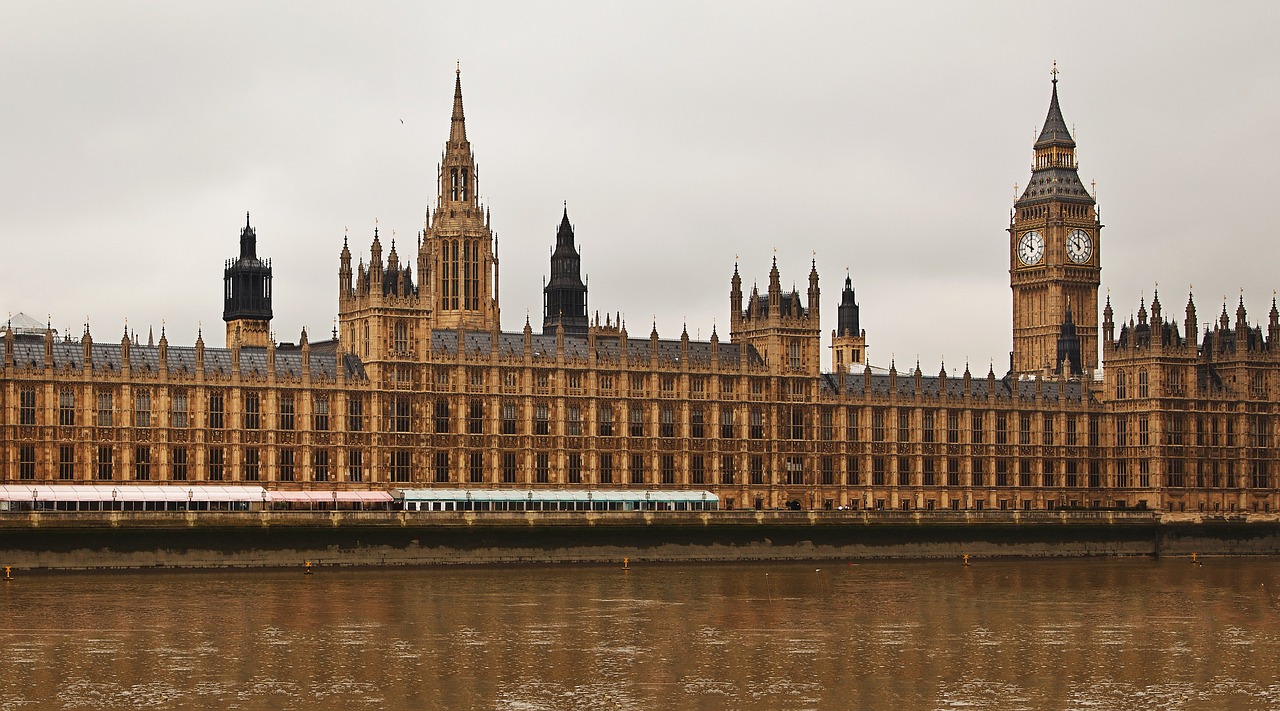
Influence on Political Thought
Machiavelli's influence on political thought is nothing short of monumental, casting a long shadow over the landscape of political theory from the Renaissance to our modern era. His work, The Prince, has been a cornerstone for understanding the intricacies of power dynamics, statecraft, and the often tumultuous relationship between ethics and governance. What makes Machiavelli's insights so enduring? It's his unapologetic realism that resonates with many political thinkers and practitioners today. He stripped away the romantic notions of politics, presenting a world where power is the ultimate currency, and leaders must be shrewd, strategic, and sometimes ruthless to survive.
One of the most significant contributions of Machiavelli is the idea that politics is a realm governed by its own rules, often divorced from traditional moral values. This perspective has led to what we now call realpolitik, a pragmatic approach to politics that prioritizes practical outcomes over ideological purity. For instance, many modern leaders and political theorists reference Machiavelli when discussing the necessity of making tough decisions that may not align with conventional ethics but are deemed essential for the stability and prosperity of the state.
Moreover, Machiavelli's ideas have sparked extensive debate and discourse in political science. His assertion that "the ends justify the means" has been interpreted in various ways, leading to a spectrum of interpretations ranging from justified political maneuvering to outright tyranny. This duality has made Machiavelli a subject of study not only in political science but also in philosophy, ethics, and even psychology. Scholars and students alike grapple with the implications of his thoughts, often questioning the moral ramifications of his advice.
To illustrate Machiavelli's enduring impact, consider the following table that highlights key political figures and movements influenced by his ideas:
| Influence | Key Figures/Movements | Context |
|---|---|---|
| Realpolitik | Otto von Bismarck | 19th-century German unification |
| Political Pragmatism | Niccolò Machiavelli | Renaissance political thought |
| Authoritarianism | Various totalitarian regimes | 20th-century politics |
| Political Strategy | Modern political consultants | Contemporary electoral politics |
As we can see, Machiavelli's ideas have been adopted and adapted across various contexts, demonstrating their versatility and relevance. The tension between ethical governance and the harsh realities of political life continues to be a hot topic among scholars and practitioners alike. This ongoing dialogue ensures that Machiavelli's legacy remains alive and pertinent, challenging leaders to reflect on their decisions and the moral weight they carry.
In conclusion, Machiavelli's work serves as a powerful reminder that understanding human nature and the complexities of power is crucial for effective leadership. His insights compel us to confront uncomfortable truths about governance, making him a pivotal figure in the evolution of political thought. As we navigate the complexities of modern politics, the question remains: are we willing to embrace Machiavelli's lessons, or will we continue to cling to idealistic visions that may not hold up in the face of reality?
- What is Machiavelli best known for?
Machiavelli is best known for his political treatise, The Prince, which offers pragmatic advice on power and governance. - Is Machiavelli considered a philosopher?
Yes, he is considered a significant philosopher in political theory, known for his realistic approach to politics. - How did Machiavelli's ideas influence modern politics?
His concepts of realpolitik and the separation of ethics from politics have shaped contemporary political strategies and discussions. - Why is Machiavelli controversial?
His perceived advocacy for manipulation and ruthless tactics in politics has led to debates about morality in governance.

Critiques and Misinterpretations
Machiavelli's The Prince has been a lightning rod for controversy since its publication. Many readers, both past and present, have grappled with its implications, often leading to significant misinterpretations. One of the most common critiques is the notion that Machiavelli is advocating for tyranny or immoral governance. Critics argue that his pragmatic approach to politics endorses ruthless behavior, suggesting that the ends justify the means. However, this interpretation overlooks the complexity of Machiavelli's arguments and the context in which he wrote.
To fully appreciate Machiavelli's work, it's essential to consider the political landscape of Renaissance Italy, characterized by instability, betrayal, and shifting alliances. Machiavelli was not simply a proponent of power for its own sake; rather, he was a keen observer of human nature and the political realities of his time. His insights into the necessity of strong leadership were aimed at ensuring stability and security in a chaotic environment, not as a blueprint for tyranny.
Another critique revolves around the idea that Machiavelli's ideas promote a cold, calculating approach to leadership devoid of ethics. This perspective fails to recognize the nuanced view Machiavelli had regarding morality in politics. He acknowledged that while traditional moral values might need to be set aside in certain situations, he did not advocate for a complete abandonment of ethics. Instead, he argued for a more realistic understanding of how political decisions are made. In this light, Machiavelli's realism serves as a guide for leaders who must navigate the murky waters of governance without losing sight of their broader responsibilities to their states and citizens.
Moreover, the label of 'Machiavellian' has often been misused in popular culture, leading to a skewed perception of his philosophy. The term is frequently associated with deceit and manipulation, painting Machiavelli as a villain in the narrative of political thought. Yet, if we delve deeper into his writings, we find that his focus was on the complexities of power and the human condition. His work challenges leaders to be adaptable and strategic, rather than merely ruthless.
In essence, the critiques of Machiavelli often stem from a misunderstanding of his intentions. He was not advocating for immoral leadership but was instead offering a realistic framework for understanding the intricacies of power and governance. As we continue to engage with his ideas, it's crucial to approach them with an open mind, recognizing their historical context and the profound insights they still offer to modern political discourse.
- What is the main argument of Machiavelli in The Prince?
Machiavelli argues that effective leadership requires a pragmatic understanding of human nature and the political landscape, often necessitating morally ambiguous decisions for the sake of stability. - Is Machiavelli promoting tyranny?
No, while some interpret his work as endorsing tyranny, Machiavelli's focus is on the complexities of power and the need for strong leadership in turbulent times. - How has Machiavelli influenced modern politics?
Machiavelli's ideas have shaped discussions on power dynamics, statecraft, and the ethical dilemmas faced by leaders, providing a foundation for modern political science. - What does the term 'Machiavellian' mean today?
The term is often used to describe cunning or deceitful behavior, though this mischaracterizes Machiavelli's nuanced views on leadership and morality.
Frequently Asked Questions
- What is the main idea behind Machiavelli's The Prince?
The Prince primarily explores the nature of power and the pragmatic approaches a ruler must take to maintain authority. Machiavelli argues that effective governance often requires a departure from traditional moral values, emphasizing the importance of realism in political leadership.
- How does Machiavelli view the relationship between power and morality?
Machiavelli suggests that there is often a conflict between power and morality. He believes that rulers may need to set aside ethical considerations to achieve political stability and success. This pragmatic approach can sometimes lead to controversial decisions that prioritize the state over individual moral values.
- What does Machiavelli mean by the concept of virtù?
Virtù, in Machiavelli's context, refers to a ruler's ability to adapt and respond to changing political circumstances. It encompasses qualities such as skill, decisiveness, and even a bit of luck. Machiavelli argues that possessing virtù is crucial for navigating the complexities of political life effectively.
- How has Machiavelli's work influenced modern political thought?
Machiavelli's ideas have significantly shaped contemporary political theory, providing a foundation for discussions about power dynamics, statecraft, and realism in politics. His work encourages a more nuanced understanding of governance, often challenging idealistic perspectives.
- What are some common misconceptions about Machiavelli's teachings?
Many people misinterpret Machiavelli as advocating for tyranny or ruthless behavior. In reality, his writings are more about understanding the harsh realities of political life rather than promoting unethical actions. He encourages rulers to be realistic and pragmatic in their decision-making processes.
- Why is it important to understand the historical context of Machiavelli's life?
Understanding the political turmoil of Renaissance Italy is essential for grasping the motivations behind Machiavelli's writings. His experiences during a time of instability and conflict heavily influenced his views on power, governance, and human nature, making the context crucial for interpreting his ideas.




